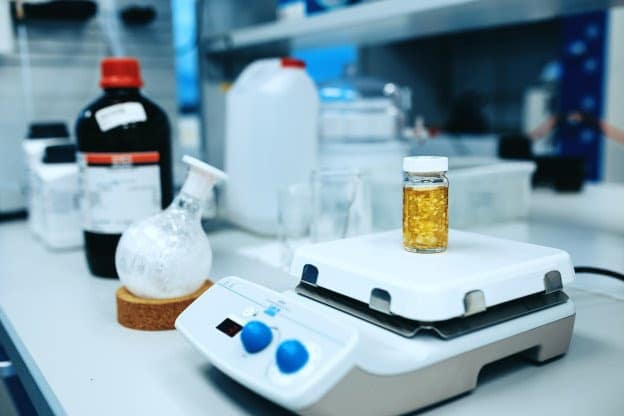The inherent lipophilic nature of cannabinoids has posed a significant hurdle in maximizing their bioavailability when consumed orally. This limitation has spurred researchers in the cannabis industry to explore innovative solutions to enhance the efficacy of cannabinoid bioavailability products. One promising avenue involves the development of water-soluble products, which can substantially increase the amount of active substances that reach the bloodstream due to their improved absorption properties. The result is a potential for greater and faster effects of cannabinoid products, marking a pivotal advancement in the field.
Addressing the Challenge
As of August 14th, 2020, researchers and experts in the cannabis industry have been grappling with the fundamental question of how to achieve greater bioavailability for cannabinoids. This challenge is of paramount importance as it directly impacts the effectiveness of administered products and can significantly optimize the utilization of active substances during the production process. Such advancements have the potential to revolutionize the development of cannabinoid solutions in the long term.
Sanobiotec’s Innovative Approach
In response to the quest for improved cannabinoid bioavailability, Sanobiotec, a pioneering cannabinoid research company, has taken proactive steps. Their focus lies in enhancing cannabinoid solubility and ensuring the overall homogeneity of their preparations. This endeavor is poised to play a critical role in terms of product applicability and effectiveness, signifying a promising development in the realm of cannabinoid research and its practical applications. Sanobiotec’s efforts hold the potential to transform the landscape of cannabinoid-based products, offering consumers more efficient and effective options for harnessing the benefits of these compounds.
The Unwavering Interest in Cannabinoids
Cannabinoids, the active chemical compounds found in cannabis plants, continue to be a topic of great significance and exploration in the world of research. Scientists and experts are delving deeper into the realm of cannabis products, constantly unearthing new and promising compounds with the potential to address a wide array of health issues, including anxiety, inflammation, insomnia, and more. However, the molecular structure of cannabinoids poses a significant challenge, limiting their full potential, as a substantial portion of these administered substances fail to reach the bloodstream.
The Challenge of Poor Absorption
One of the primary hurdles in realizing the full potential of cannabinoids is their poor absorption properties. Researchers have increasingly shifted their focus toward the development of water-soluble cannabinoid products to overcome this limitation. To illustrate this point, consider cannabidiol (CBD), one of the most well-known cannabinoids. When consumed orally, CBD is believed to provide as little as 4 percent of its original CBD content. The reason behind this lies in the lipophilic nature of CBD, meaning it has a natural affinity for dissolving in lipids (fats) but struggles to mix effectively with water. Given that water makes up roughly 60 percent of the human body, this poor water solubility severely restricts its absorption.
Sanobiotec’s Pioneering Research
Sanobiotec, a leader in cannabinoid research, has embarked on a mission to develop water-soluble cannabinoid products that can address this absorption challenge. Their research has unearthed a clear and well-defined relationship between the bioavailability of any molecule and its hydrophobicity—the degree to which it repels water. In essence, the more hydrophobic a drug or compound is, the less efficiently it is absorbed through the gut membrane into the bloodstream. The pharmaceutical industry has developed various methods to mitigate such limitations, with one of the most popular being the creation of drug-carrier complexes. This involves formulating a drug in a manner where it performs its intended function while the carrier molecule aids in its transport. Such methods have been known to significantly increase drug absorption.
Renaldas Rimkus, Head of Research and Development at Sanobiotec, elaborates, “By adopting strategies reminiscent of the pharmaceutical approach, we decided to explore two highly efficient methods: the utilization of liposomal microparticles and the formation of cannabinoid/dextrin complexes.” Deep literature analysis on drug delivery complexes and their formulations, along with the application of advanced techniques, has led to the development of high-quality, highly stable, water-soluble cannabinoid products available in both powder and oil forms. These products not only exhibit increased bioavailability but, more importantly, facilitate the ease of product administration.
Collaborative Efforts for Maximum Efficacy
Sanobiotec has been collaborating with experts from various research facilities, pooling their collective knowledge and cross-industry insights to devise innovative solutions. These solutions are engineered to maximize uptake potential and efficiency in treating a range of illnesses. Through the fusion of diverse research methods and interdisciplinary expertise, Sanobiotec is at the forefront of pioneering advancements that hold promise for the future of cannabinoid-based treatments.
Understanding Cannabinoid Bioavailability and Its Impact
Cannabinoid bioavailability is crucial. It defines how much of a compound reaches the bloodstream after administration. This affects how quickly it can have biological effects. Different products have different rates of bioavailability.
For instance, when cannabinoids are inhaled, they enter the bloodstream rapidly. This results in a quick onset of effects. Edibles, however, must pass through the digestive system first. Thus, their effects are slower to appear but may last longer.
Researchers emphasize that understanding bioavailability is key. It determines the product’s efficacy for therapeutic use. The right dosage can vary widely depending on bioavailability.
 Water-Soluble vs Fat-Soluble Cannabinoids
Water-Soluble vs Fat-Soluble Cannabinoids
Researchers have found that water-soluble cannabinoids are more readily absorbed by the body than their fat-soluble counterparts. This increased absorption is due to the fact that water-soluble compounds can dissolve in water, making them easier for the body to process. They do not require dietary fats to be present for optimal absorption, unlike fat-soluble cannabinoids. The latter rely on lipids to enter the bloodstream effectively.
The solubility of a cannabinoid affects how it is used in consumer products. Products with water-soluble cannabinoids, such as beverages and topical applications, benefit from a higher dissolution rate. This means they can deliver effects more quickly and efficiently. On the other hand, fat-soluble cannabinoids are often included in oil-based products like tinctures and edibles.
-
Water solubility leads to enhanced absorption.
-
Fat solubility requires dietary fats for optimal uptake.
The physicochemical properties of these molecules determine their phase solubility—a crucial factor that influences bioavailability. Lipophilic compounds must navigate through an aqueous environment before reaching systemic circulation, which can limit their effectiveness.
Enhancing Bioavailability with Water-Soluble Cannabinoids
Researchers use nanotechnology to create water-soluble cannabinoids. This technology breaks down the compound into tiny particles. These small particles mix better with water. The body absorbs them more easily than fat-soluble forms.
Water-soluble cannabinoids have a quicker onset of effects. This is because they enter the bloodstream faster than their oil-based counterparts. Faster absorption means users feel results sooner.
This improved bioavailability has another benefit: it can lower the amount needed to achieve desired effects. When less product is required for efficacy, it may also reduce potential side effects.
Therapeutic Applications of Cannabinoids in Medicine
Cannabinoids have garnered attention for their therapeutic potential in various medical conditions. Researchers focus on their ability to treat chronic pain, a prevalent issue affecting millions globally. These compounds exert significant anti-inflammatory effects, which are crucial in managing pain. Studies indicate that cannabinoids reduce inflammation and, as a result, alleviate discomfort associated with chronic pain disorders.
The therapeutic benefits of cannabinoids extend beyond pain relief. They also show promise as anxiolytic agents, potentially aiding individuals with anxiety disorders. Human studies suggest certain cannabinoids may act as agonists at neural receptors known to regulate fear and anxiety-related behaviors. This action underscores their potential use in therapy for anxiety issues. Key therapeutic applications include:
-
Management of chronic pain;
-
Reduction of inflammation;
-
Treatment for anxiety.
While exploring the medical use of these botanical drugs, scientists consider cannabinoid bioavailability critical to maximizing therapeutic efficacy. Increased bioavailability means patients could achieve desired outcomes with lower doses, reducing possible side effects linked with higher drug intake.
Pharmacokinetics of Cannabis in the Body
Cannabis pharmacokinetics involves absorption, distribution, metabolism, and excretion. These processes determine how cannabinoids like THC and CBD affect the body. Oral consumption is one method of drug administration. It leads to a delayed onset of psychoactive effects due to first-pass metabolism in the liver. This means that when cannabis products are ingested, they pass through the gastrointestinal tract before reaching systemic circulation. There, substances undergo significant chemical changes.
In contrast, inhalation delivers cannabinoids directly into the bloodstream via the lungs. This bypasses liver metabolism initially, leading to rapid plasma concentration increases. However, this method can produce less predictable endocannabinoid levels due to variables such as inhalation depth and duration. Understanding these physiological processes helps predict therapeutic outcomes and potential adverse effects from cannabis use.
The distribution of cannabinoids within bodily tissues depends on various factors, including pH levels and blood flow rates. Once distributed throughout the body, these compounds must be metabolized by enzymes primarily found in the liver before being excreted mainly through urine or feces.
Cannabinoids and Neurodegenerative Disease Management
Researchers are exploring the neuroprotective properties of cannabinoids. They believe these properties might slow the progression of neurodegenerative diseases. In laboratory studies, certain cannabinoids have shown potential in protecting nerve cells from damage and degeneration. This suggests they could be beneficial for conditions like Alzheimer’s disease or Parkinson’s.
Neurodegeneration often leads to symptoms such as muscle spasms and tremors. Studies indicate that cannabinoids can provide relief from these symptoms. For example, patients with multiple sclerosis may experience fewer muscle-related issues when treated with cannabinoid therapies.
The ability of cannabinoids to modulate neurotransmitter systems is a key focus area for scientists. These compounds interact with receptors in the brain that influence pain, mood, and cognitive function. By doing so, they may offer therapeutic benefits for CNS diseases marked by neurotransmitter imbalance.
Cannabinoids in Cancer Therapy and Research
Researchers are delving into the potential of cannabinoids to inhibit tumor growth. Studies suggest that certain cannabinoid compounds may slow down or even kill cancer cells. Clinical trials focus on isolated cannabinoids as well as cannabis extracts. They observe how these substances interact with the endocannabinoid system present in human bodies.
The effects of phytocannabinoids, which come from plants, are also under investigation. Some clinical studies point out promising results when using cannabinoids alongside chemotherapy agents. The goal is to enhance the effectiveness of conventional cancer therapies.
In addition to their possible anti-tumor properties, researchers assess how cannabinoid products can help with the side effects of cancer treatment. Oral cannabinoids show promise in stimulating appetite and controlling nausea among cancer patients.
Future Perspectives and Innovations in Cannabinoid Bioavailability
Researchers are exploring novel delivery systems to enhance cannabinoid bioavailability. One promising avenue is the development of transdermal patches. These patches allow cannabinoids to enter the bloodstream through the skin. This method bypasses the digestive system, improving bioavailability. Another innovative approach includes advanced inhalers that ensure more precise dosing.
The field is also moving towards personalized medicine. Experts believe tailoring cannabinoid therapies to individual genetics could revolutionize treatment outcomes. They use preclinical evidence to understand how different genetic profiles affect drug metabolism and efficacy.
Ongoing research focuses on the long-term health impacts of increased bioavailability. Researchers conduct experimental models and clinical trials to gather data. They aim to understand how enhancing availability affects patients over time. Their findings may lead to safer, more effective treatments for various conditions.
Summary
Researchers have provided a comprehensive exploration of cannabinoid bioavailability, underscoring its pivotal role in the efficacy of cannabis-based therapies. They have elucidated the distinction between water-soluble and fat-soluble cannabinoids, revealing that enhancing bioavailability through water-solubility can significantly improve therapeutic outcomes. Studies on the pharmacokinetics of cannabis within the body further demonstrate the complexity and potential of cannabinoids in treating neurodegenerative diseases and cancer. Innovations in this field continue to evolve, promising to unlock new medical applications and more effective treatment modalities.
Reference:
Cannabidiol (CBD) in Cancer Management
Human Cannabinoid Pharmacokinetics
-END-
ABOUT SANOBIOTEC
Sanobiotec is a cannabinoid research company committed to the identification, development and formulation of innovative active compounds via natural hemp extraction, synthesis, and biosynthesis. Headquartered in Vilnius, Lithuania, the company operates a state-of-the-art laboratory and develops proprietary technological solutions designed for the production of natural and custom compounds. Sanobiotec is also engaged in scientific research projects investigating the potential of cannabinoid-based medications used for the treatment of specific diseases.
For more information visit: www.sanobiotec.com and linkedin.com/company/sanobiotec
Media contact:
Ieva Mackeviciute

 Water-Soluble vs Fat-Soluble Cannabinoids
Water-Soluble vs Fat-Soluble Cannabinoids










